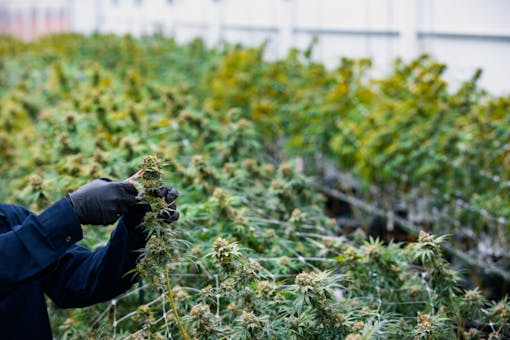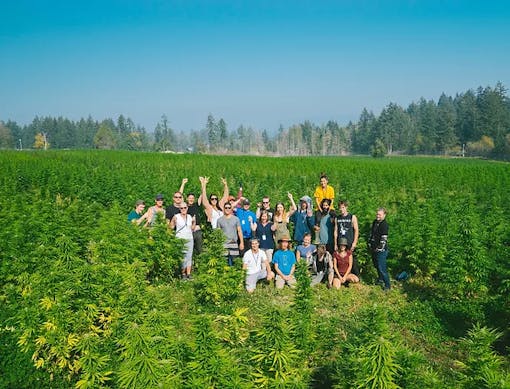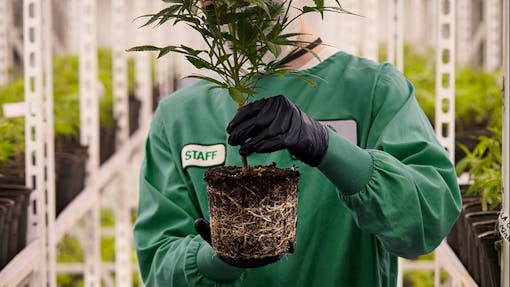A growing number of Canadian cannabis consumers are looking for more than just high THC content when shopping for their cannabis products.
In these times of raging wildfires, devastating floods, and rising sea levels, climate anxiety takes its toll and consumers want to reduce their own environmental impact.
Consumers are getting savvier when it comes to researching various weed companies. They want to know how cannabis is grown, processed, and packaged.
And frankly, not all cannabis products have an equal environmental impact.
These brands offer terpene and cannabinoid-rich weed and are actively working towards environmental, social, and/or economic sustainability.
Sustainable cannabis brands across Canada
Simply Bare by Rubicon Organics
British Columbia has a reputation for having lots of environmentally-minded citizens, so it’s no surprise that many organic and sustainable cannabis companies have rooted themselves in the province.
The Simply Bare line of cannabis products from Rubicon Organics in Delta, BC, puts several sustainability practices to work to produce quality cannabis available across Canada.

Sustainability features:
- Sungrown cannabis in hybrid greenhouses supplemented with high efficiency LED lights.
- Uses living soil grow medium (active ecosystem of beneficial biological soil organisms to help make nutrients naturally available to the plants).
- Locally sourced inputs from the BC coast including Douglas Fir bark, worm castings, kelp, and fish meal.
- Organic certification through Fraser Valley Organic Producers Association (FVOPA).
- Working toward meeting standards of an Environmental Farm Plan which includes a CO2 capture/reuse system, 100% rainwater recycling, and net-zero energy and waste.
Products:
- Dried flower (flower and pre-rolls)
- Hash
- Live rosin
- PAX distillate pods
Good Buds by Good Buds Company
Good Buds, from Salt Spring Island, BC, is a family-run company founded in the back of a van that produces “craft cannabis in organic soils next to the Salish Sea.”
Good Buds is an example of how sustainably grown cannabis can be exceptionally high quality, having won Kind Magazine’s 2020 Concentrate of the Year award.

Sustainability features:
- Grown in recycled shipping containers
- All products, including extracts, are organically certified
- No chemicals used for extraction (they use ice water and heated press)
- Rainwater recapture system
- Organic certification through Fraser Valley Organic Producers Association (FVOPA)
- Uses living soil grow medium
- BC’s first Certified Living Wage Employer in cannabis
Products:
- Dried flower (flower and pre-rolls)
- Bubble hash
- Solventless rosin
The Green Organic Dutchman (TGOD)
The Green Organic Dutchman (TGOD) has the philosophy that they need to do more than grow certified organic cannabis, they are about cultivating a way of life. They take a broad approach to sustainability in decisions made from their facility, to packaging, to products, to staff clothing, and more.
Based out of Ancaster, ON, their sustainability practices go beyond environmental to include environmental, social, and corporate governance (ESG), including being part of a “Good Neighbour” program and growing organic fruits and vegetables to donate to local food banks.

Sustainability features:
- Hybrid greenhouses with sunlight/LED lighting system
- Rainwater recapture system to reduce water and electricity use
- Living Soil grow medium reduces their landfill waste to the tune of avoiding 200,000 stone wool units of landfill waste/year (roughly the size of 3 NHL hockey rinks)
- Facilities built to Leadership in Energy and Environmental Design (LEED) standards
- Black-out blinds to prevent light pollution
- First certified organic producer in Canada to obtain European Union Good Manufacturing Practices (EU-GMP) certification in preparation for commercialization later this year
- First cannabis company in Canada to complete an Environmental Farm Plan
- Participates in “Operation Pollinator”, an international biodiversity program, and in Ontario’s “Barn Swallow Project”
Products:
- Dried flower
- THC and CBD oils
- Edibles: dissolvable powder, teas, gummies
- Vape extract cartridges
Stewart Farms
Stewart Farms is an organic cultivator that farms “fish, weed, and microbes” in Saint Stephen, NB. Using aquaponics and living soil, they are able to produce organic cannabis sustainably, using as little plastic as possible. Stewart Farms started off with bath bombs and has recently added craft cannabis and pre-rolls to their product portfolio.

Sustainability features:
- Closed-loop water recycling system, which typically uses less water than conventional agriculture
- Fish by-products are converted to natural nutrients for the plants
- No pesticides or synthetic fertilizers
- Composts plants and living soil for reuse outdoors
- 100% biodegradable packaging, including the pre-roll tubes and film on the bath bombs (for home composting, follow regional waste management protocols)
- Recognized by Atlantic BIOCON as integral part of New Brunswick’s bioeconomy
- “We employ 16 part time people from the local vocational center, most have never had a bank account before we hired them,” shares co-founder Tanner Stewart
Products:
- Infused (and non-infused) bath bombs
- Craft flower
- Pre-rolls
Reef Organic by Aqualitas
Reef Organic products by Aqualitas is a stand-out company in sustainable practices. Based out of Brooklyn, NS, Aqualitas combines aquaculture and organic living soils to produce consistent quality cannabis products.
CEO Myrna Gillis says that sustainability is promoted and supported at all levels of leadership, and their sustainability philosophy is to “do no harm and to do better.”
She notes that growing indoors using an ecological design (aquaculture merges fish and plants for less waste, better nutrients) is part of a sustainable future in an uncertain climate and increasing soil erosion.
They aim to provide “the healthiest products grown as close as possible to the conditions in nature”, which has paid off, as they have been featured twice by High North Labs for the highest cannabinoid profiles, including a 34% cannabinoid content for their Ghost Train Haze.

Sustainability features:
- Sustainability commitment from the grow to the packaging
- Low square footage aquaponics facility, they make their own balanced fish food for their long-lived koi fish
- Committed to fair trade and a 5% carbon footprint reduction each year
- Use of greywater systems for water use reduction
- Ocean Sourced Packaging- plastic pollution from the ocean gathered, reclaimed, and repurposed for packaging
- All Reef Organics products are Clean Green Certified (CGC)
- Winner of Spark Innovation Award and Clean Tech Energy award
Products:
- Dried flower (flower and pre-rolls)
- THC and CBD oils
- Vape extract cartridges
- Rosin
- Edibles (gummies)
Consumers—watch out for greenwashing
What does sustainable cannabis even mean? The word sustainability has evolved and adapted to mean not just environmental sustainability, but social and economic sustainability as well.
Some cannabis companies are guilty of “greenwashing”—appearing to be more environmentally friendly than they actually are in practice. In looking for truly earth-friendly cannabis, we have looked beyond surface-level claims to find those companies that actually walk their sustainability talk.
Shopping for sustainable products doesn’t have to require an overwhelming amount of research or an in-depth understanding of sustainability principles and agricultural practices.





